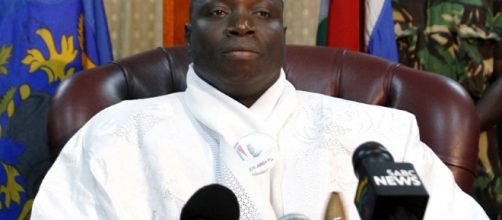In a number of African countries, the leaders have entered into a marriage of forever with the people they govern. The only problem is it is usually without their consent. And there is no fairy tale of happily ever after. In Equatorial Guinea, Angola, Zimbabwe, Cameroon, Uganda, Sudan, Chad; each president has ruled for at least 25 years.
Currently bidding to join their ranks is President Yahyah Jammeh of West African country, the Gambia. As a young army officer, he took power in a military coup in 1994. In 1996, he was elected as the president, a position he has held since and has never come under threat until now.
Yes We Can…No I Won’t
On Dec. 1 2016, Gambians went to the polls to decide who would be their new president. In a shocking turn of events, the election was won by the opposition candidate, Adama Barrow, a businessman who was put forward to contest the long-serving president by a coalition of parties. He had no previous political history and won 45.5 percent of the vote to sitting President Jammeh’s 36.7 percent. Even more surprisingly, Jammeh who had previously sworn he had a ‘billion-year mandate’ to rule, conceded.
In a televised statement, he announced, “I take this opportunity to congratulate Mr. Barrow for his victory. It’s a clear victory. I wish him all the best, and I wish all Gambians the best.
As a true Muslim who believes in the almighty Allah I will never question Allah’s decision. You Gambians have decided.”
It was a rare moment of hope for the nation of 2 million people, most of the population had never known another president.
On a recorded phone call to Mr. Barrow, Jammeh said, “Congratulations. I’m the outgoing president; you’re the incoming president. Eight days later, on Dec. 9, 2016. He changed his mind.
What Will Happen Jan. 18?
The winner of the election, Adama Barrow, insists he is to be sworn in come Jan. 18. President Jammeh is adamant that the swearing in ceremony will not happen.
“After a thorough investigation, I have decided to reject the outcome of the recent election.
I lament serious and unacceptable abnormalities that have reportedly transpired during the electoral process,” Jammeh said in a statement made on television.
Member countries of the Economic Community of West African States (ECOWAS) have been trying to intervene in the impasse, making Jammeh see reason. Prior to this, soldiers had been seen setting sandbags in strategic locations in the capital, raising tensions in the country and sparking panic-buying of food.
“I am not a coward. My right cannot be intimidated and violated. This is my position. Nobody can deprive me of that victory except the Almighty Allah,” Jammeh said.
President Muhammadu Buhari of Nigeria is reported to be leading a delegation to Gambia, on Friday, Jan.
13, to further discuss issues with Jammeh.
ECOWAS has however identified other options should talks not go as planned.
According to reports, a battalion is being raised by the Nigerian Army, to be deployed in the Gambia, to remove President Yahya Jammeh from power should he fail to step down on Jan. 19.
On Dec. 23, 2016, ECOWAS required military forces to be put on high alert. The ECOWAS Commission President Marcel De Souza has announced the operation will be led by Senegal, the Gambia’s sole neighbor and other ECOWAS countries will provide forces as well.
Ahead of talks, The Nigerian National Assembly is also considering whether to offer President Jammeh asylum. A motion has been raised that asks whether Jammeh should be given "safe haven as part of the reconciliation process of the crisis going on in Gambia."
This Big Brother peace-maker role is not new to Nigeria.
In August 2003, the Nigerian government under President Olusegun Obasanjo granted political asylum to Liberia’s Charles Taylor. The circumstances are similar to Jammeh’s, the distinction being the Gambia isn’t embroiled in a civil war yet.

